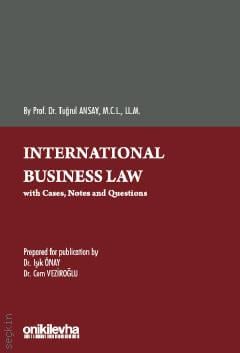
International Business Law
1. Baskı,
Mart 2024
Kitabın Detayları
Dili:
İngilizce
Ebat:
17x25
Sayfa Sayısı:
445
Kitabın Fiyatı:
750,00₺
Temin süresi 2-3 gündür.
Kitabın Açıklaması
This book is a product of Prof. Ansay's lectures from a 4th year undergraduate elective course on international business law (IBL) at Koç University Law School in Istanbul, where a curriculum was implemented to match the needs of increasingly global and international economies. There are many books on IBL on the market. These are mainly geared towards the needs of Western developed states, and the needs of law students in those countries.
The main purpose of this book is to provide students and young practicing lawyers with background information on general issues of IBL. Although the main audience of this book is law students and young practicing lawyers entering the international practice of business law, the book may also prove to be beneficial for students of business administration, as well as other persons dealing with international business.
Kitabın Konu Başlıkları

Introduction

Actors in International Business

Sources of International Business Law

Language

Procedural Law

Commercial Arbitration
Kitapla İlgili Kategoriler
Yorumlar
Kitabın İçindekileri
TABLE OF CONTENTS
Chapter 1
Introduction
I. Prologue
II. What does "international business law" indicate?
A. Nationstate?
B. National, inter–national, trans–nationalsupra–national business law
C. International business
D. How does international business law differ from domestic business law?
E. Is international business law an independent field of law?
Chapter 2
Actors in International Business
I. Actors in general
II. Actors in particular
A. The State as an actor in international business
B. Real (natural) persons
C. Legal (juristic, artificial) persons
D. Group companies and multinational companies
E. Joint ventures (JV)
Chapter 3
Sources of International Business Law
I. General remarks
II. Public international (transnational) law as the resource for international business practice
A. General principles of public international law
B. The role of the United Nations
III. Private international law
A. In general
B. In particular
IV. Officiallyprivately prepared domestic rules as sources of international business relations
A. In general
B. Unification and harmonization of the laws of international business
V. Comparative law as a source of international business law
A. Comparative law at the micro level
B. The use of comparative law in practice by judges and practicing lawyers
VI. International customary law among merchants (lex mercatoria)
VII. Secondary sources
A. Scholarly publications as sources of international business
B. Court decisions
VIII. Hierarchy of applicable laws
Chapter 4
Language
I. Some general remarks on the significance of language in international business
II. Mandatory use of language
III. Legal problems caused by acting against the rules on language
IV. English as a common language for international businesspeople?
Chapter 5
Procedural Law
I. International civil procedure
II. Actors and courts in the distribution of justice
A. Judges and courts
B. Scholars
C. Practicing lawyers (attorneys)
III. Jurisdiction
IV. In general – courts with jurisdiction over international commercial disputes
A. Rules on jurisdiction
B. Exclusive jurisdiction, choice of jurisdiction; agreements on jurisdiction (Exclusive vs. alternative jurisdictions)
V. Litigation (Trial)
A. General remarks
B. Some procedural issues effecting the court process (Qualification)
C. Res judicata and lis alibi pendens
D. Proof of foreign law
E. The relationship between the applicable substantive law and jurisdiction of the courts
F. Enforcement (and Recognition) of foreign court decisions on commercial matters
Chapter 6
Commercial Arbitration
I. In general: What is commercial arbitration?
II. Different types of arbitration
III. Sources
IV. Form ments
V. Third party effect
VI. Freedom of arbitration and the role of the State
A. Arbitrability
B. Arbitration and the State
VII. Comparison of State courts and international commercial arbitration
VIII. Enforcement (and recognition) of foreign commercial arbitration awards
A. When there is an international award?
B. Conditions for enforcement
Kitabın Fiyatı:
750,00₺
Temin süresi 2-3 gündür.
Hakkımızda
|
Uluslararası Yayınevi Belgesi|
Kaynakça Dosyası|
Kişisel Verilerin Korunması |
Üyelik|
Siparişlerim|
İade Politikası|
İletişim


